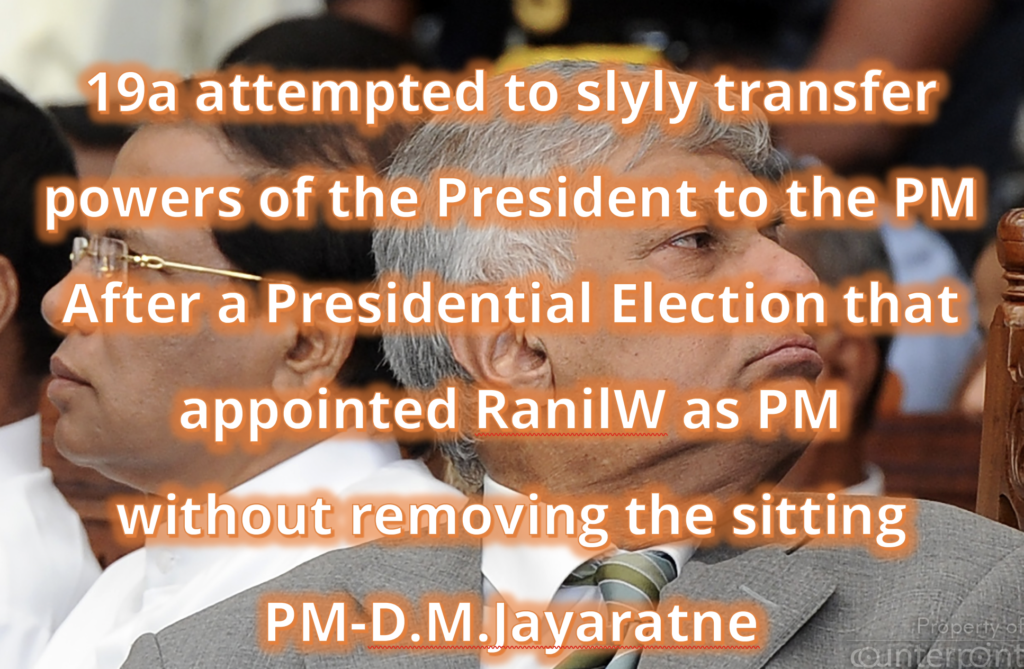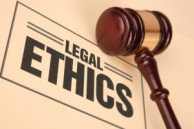19th amendment attempted to transfer powers of the President to the PM

It was clear that 19a was drafted taking into consideration the President in power & the hurriedly appointing Ranil Wickremasinghe who was Opposition Leader as PM without removing the sitting PM (D M Jayaratne) The legality of this remains unanswered. 18 FR petitions were filed in SC. There were amendments to amendments with little time for Counsels to study before making submissions. Though public had a week to study as per Article 121, they did not get access to the latest version. This was a FR violation of the people’s right. Article 122 gives SC 24 to 72hours for Urgent Bills and if Article 121 is applied the Court can take 3 weeks for deliberation & until such time the Bill cannot be taken in Parliament. This was why 19a was rushed through Parliament as an Urgent Bill.
19a is full of confusions & contradictions.
19a was presented as an Urgent Bill and passed giving little time for People to object
19a that was passed differed to what was sent to Supreme Court for determination
- Why did 19a include age limit of 35 years to contest as President?
- Why was Presidential term limited to 2 terms
- Why was dual citizen clause inserted (was it in national interest or to deny anyone contesting – this is an important insertion but it was never properly enacted as even the Election Commission did not include provision to question if anyone was a dual citizen before accepting nominations)
19a clipped President’s Powers to PM & confusions
- President cannot dissolve Parliament at his discretion & could dissolve only after 4 ½ years (as was done earlier – the disadvantage of this can be seen currently, where with the resignation of PM Mahinda, Parliament should have been dissolved & a new Govt elected instead of a person coming through the backdoor becoming PM)
- President could not remove the PM – only Parliament could
- President had to take advice from PM in appointing or removing Cabinet/non Cabinet/Deputy Ministers
- Contradictions in Clause 9 – Article 43(2), 44(1), 45(1) and 46(3)(a) contradicted with Article 43(1), 44(2) – first says President has to take advice in appointments & removals but second says President may choose to consult on appointments & removals. It also contradicts with Article 43(3) and 44(3) which says President may at any time change subjects/functions of cabinet/non cabinet & composition of Cabinet
- Presidential Immunity removed & subject to FR jurisdiction in SC
- President could not submit to a People’s Referendum any Bill rejected by Parliament
- President could not assign himself any subject/function not assigned to a Cabinet Minister
- 19a says President may not hold a portfolio – yet President is Head of Govt, head of Cabinet & Commander in Chief of the Armed Forces! As Head of the Cabinet he is a Cabinet Member. Voters gave executive powers to a President not for him to be a ceremonial President.
- If President decides on subjects of MPs and their powers & President appoints all MPs what is the point in inserting President ‘may not’ hold a portfolio in 19a?
- As per Article 30 the President is Head of the State, Head of the Executive & Govt, Commander in Chief of the Armed Forces & has right to declare war & peace, however Section 51 of 19a says only the current President will hold Ministry of Defense. So in a future government though President is Commander in Chief of the Armed Forces, to declare war he has to get the approval of the Defense Minister while the Defense Minister is appointed on recommendation of the PM. The PM cannot direct the Defense Minister to fight a war because the President can only decide that!
- Article 154 allowing provision for President to dissolve Provincial Council was attempted to be slyly transferred from President to the PM/Parliament via Article 33a(2) of 19a – this was aligned with the calls for a separate state.
- As per Article 43(2) of 19a President can only appoint Ministers on advice of PM. President is not a MP & cannot hold a Ministry. Yet, Article 30(1) says President is Head of Executive, Head of Cabinet, Head of Government, Commander in Chief of Armed Forces YET Article 42(3) says PM is Head of Cabinet. If PM is Head of Cabinet, how can President attend it?
- Maithripala Sirisena held 3 ministries – Defense, Mahaweli Development & Environment but as per 19a these portfolios were only valid for sitting President & not future Presidents. How can there be a constitutional amendment applicable to only 1 President!
President has to seek opinion of PM to appoint specific Ministers, but
Article 46(1) of 19a allows him to decide on the number of Ministers with restrictions
Article 43(1) of 19a allows him to decide subjects & functions of Ministers
Article 43(3) of 19a allows him to change functions, subjects & composition of the Cabinet without approval of PM – this means the President can keep changing Cabinet Ministers as he likes.
Article 50(a) of 19a allows President to appoint all Secretaries to Ministries
Article 42(3) of 19a President is a member of the Cabinet & Head of the Cabinet. Though he is a member & head of Cabinet, the President cannot hold a Ministry but he has to hold Cabinet meetings!
Article 33(2) of 19a – President makes Policy Statement of the Government in Parliament. What if the President is from a different party to the party holding majority in Government which means the PM should be making the policy statement though President is Head of State. What if the President & PM disagree on the policy – the President has the powers to keep on changing & appointing Secretaries of his choice & Ministers would have to work with these Secretaries.
Where conflict can arise: The PM decides who should be Minister but the subjects & functions of these Ministers are decided by the President as well as the Secretaries assigned to the Ministries.
Powers of the President is curbed by 19a – he remains answerable to Parliament (Section 6 of 19a) in exercising, performing, discharging his duties including public security.
The Executive President is answerable to Parliament but Parliament is not answerable to anyone & PM is not subject to any sort of review.
19a does not provide any limitation to the PM’s powers.
Other Confusions & Ambiguities in 19a
- Cabinet & Non-Cabinet could not exceed 30 while Deputy Ministers could not exceed 40 however a ‘national government’ allows Cabinet to have 45 and Deputy Ministers 55 but would be applicable only to the 2015-2020 Government.
- The 7 member Constitutional Council which included 3 eminent persons who would decide nominees for Independent Commissions & AG/IGP/Ombudsman/Secretary General of Parliament, CJ and Judges of other courts.
- Constitutional Council required 5 members to be present for quorum but Chairman did not have vote unless for an equal vote, which invariably meant that Chairman would always end up voting.
- While President’s immunity was removed CC which was making decisions/approvals & recommendations was made immune from any legal action & no one could question the decisions of the CC.
- CC was allowed to reject nominee of President even without valid reasons – this meant President could keep sending names & CC could reject them.
- Independent Commissions re-introduced. The bias of the ‘independent commission’ was evident from the behavior of the Election Commission member Hoole, who even went to file FR cases against a MP. Election Commission was not answerable to anyone while other Independent Commissions were answerable to Parliament. Role of Election Commission is not given & not mentioned in standing orders in Parliament.
- Election Commission lack of ‘independence’ was seen in its inaction while PC elections were postponed for 2 years by the Commission. So-called independent commission member Hoole even filed FR against holding elections!
- Right to Access of Information was included in 19a but contents of the Bill was not publicized!
Good aspects of 19a
- Inclusion of dual citizenship denial to be a MP or President
- Removal of “Urgent Bills’ used to pass legislation (Bill has to be made available to public & given 14 days before placed on the Order Paper of Parliament – prior to 19a it was only 7 days)
Major fallacies of 19a
- While CC nominated IGP and President appointed him – there was no clause regarding his termination. Following the Easter Sunday, the IGP could only be sent on compulsory leave & a deputy IGP was appointed.
- Impediment to democracy (will of the People) placing restrictions on the dissolution of Parliament – allowing to dissolve Parliament in 4 ½ years of a 5 year term has no logic especially in instances where a Government is not functioning to the people’s wishes & people appeal to the President to take action – he cannot because of this 19a clause preventing him from dissolving Parliament.
19a & Supreme Court
Article 80(3) imposes a ban on Supreme Court from reviewing a law after it has been passed and no court or tribunal can inquire into it.
19a was passed no differently to how 13a was passed. 13a had a 9member bench with CJ Sarvananda. 3 judges upheld 13a, 5 judges claimed it contravened Article 2 of the Constitution, Judge Palinda Ranasinghe impugned certain provisions which AG Shiva Pasupathi made amendments to in the Bill & was hastily passed. 13a remains a problem for this reason, the very reason why 19a is full of ambiguities as well.
Article 2 of 19a attempts to replace Article 4(b) of Constitution providing President executive powers including defense. This has to be read alongside Article 33a of 19a which makes President act on advice of PM or a Minister authorized by PM.
Though 19a as per Article 2(b) says executive powers are with the President, in reality it is negated by Article 33a(2) which gives executive powers to the PM & not the President. This is a violation of the legal maxim ‘delegatus non potest delegare’ which in other words means delegated power cannot be re-delegated (thus the President cannot delegate powers given to him to the PM) – ‘shall’ is used as a mandatory requirement for the President in the 19th amendment (Articles 33A (2) and (3) reduces the President to a mere puppet in the hands of the PM and questions the duplicity in including a clause that says the President exercises the People’s power.
Party leaders objected to the clause that required President to act on advice of PM & it was removed from gazette presented to parliament but was included in draft sent to Supreme Court.
Shenali D Waduge





